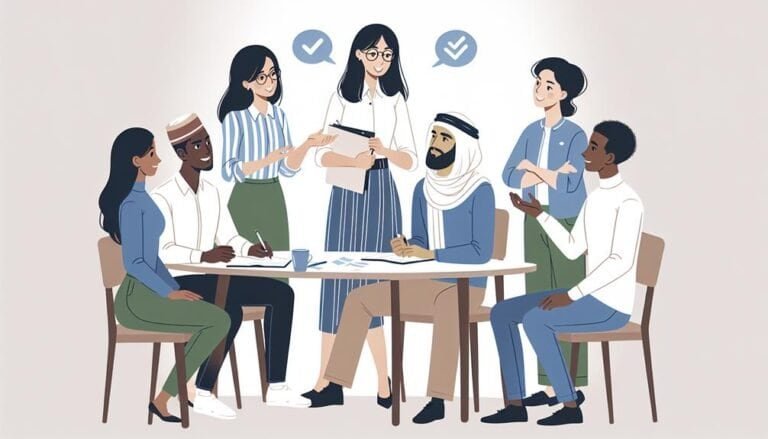Emotional Intelligence in Negotiations: Achieving Win-Win Outcomes
In the realm of negotiations, the ability to navigate and understand emotions can be just as crucial as the facts and figures being discussed. Emotional intelligence, often overlooked in traditional negotiation strategies, plays a pivotal role in achieving mutually beneficial outcomes.
By honing the skills of empathy, effective communication, and recognizing nonverbal cues, negotiators can build rapport, establish trust, and navigate obstacles with finesse.
The application of emotional intelligence in negotiations not only enhances problem-solving capabilities but also paves the way for win-win solutions that can transcend the immediate deal on the table.
Understanding the nuances of emotional intelligence in negotiations opens up a realm of possibilities for creating sustainable and mutually beneficial agreements, making it an essential aspect of successful negotiation strategies.
Key Takeaways
- Emotional intelligence is crucial for successful negotiations, as it involves recognizing and understanding one's own emotions.
- Empathy plays a vital role in negotiations by fostering collaboration, building relationships, and de-escalating conflicts.
- Managing emotions and building rapport are essential for maintaining productive dialogue and establishing trust and credibility.
- Recognizing and interpreting nonverbal cues, such as body language and facial expressions, can provide valuable insights into emotions and intentions during negotiations.
Understanding Emotional Intelligence
Understanding emotional intelligence is essential for effective negotiation in both personal and professional settings. Emotional intelligence encompasses the ability to recognize and understand one's own emotions, as well as those of others. Individuals with high emotional intelligence exhibit strong self-awareness, enabling them to accurately recognize their emotions and how these emotions may influence their behavior and decision-making during negotiations.
Furthermore, self-awareness allows individuals to understand their strengths and weaknesses, providing them with the opportunity to leverage their strengths and mitigate the impact of their weaknesses during negotiations.
In addition to self-awareness, emotional intelligence also encompasses social skills, which are crucial for successful negotiations. Individuals with strong social skills can effectively navigate social complexities, build rapport, and foster positive relationships with others, all of which are invaluable in negotiation scenarios.
These individuals are adept at managing disputes, are persuasive communicators, and possess the ability to inspire and influence others. By honing their emotional intelligence, individuals can enhance their negotiation prowess, ultimately leading to more favorable outcomes in both personal and professional negotiations.
Importance of Empathy in Negotiations
Empathy plays a pivotal role in negotiations, as it enables individuals to understand and connect with the emotions and perspectives of the other parties involved, fostering a more collaborative and mutually beneficial negotiation process.
Building relationships through empathy is key to successful negotiations, as it allows parties to establish trust and rapport, leading to open and transparent communication.
By actively listening and acknowledging the feelings and concerns of the other party, negotiators can create a supportive and understanding atmosphere, which is essential for reaching win-win outcomes.
Moreover, demonstrating empathy can help de-escalate conflicts and reduce tension during negotiations, paving the way for constructive problem-solving and compromise.
Ultimately, empathy humanizes the negotiation process, reminding all parties that behind the business objectives and strategies are individuals with unique experiences and emotions.
This understanding can lead to more empathetic and considerate decision-making, strengthening the foundation for long-term, mutually beneficial relationships.
Managing Emotions for Effective Communication
In negotiations, managing emotions is crucial for effective communication. Emotion regulation techniques and awareness of nonverbal cues play a significant role in maintaining a productive dialogue.
Emotion Regulation Techniques
Effective communication in negotiations often requires the adept management of emotions through specific regulation techniques. Emotion regulation is crucial for maintaining a conducive atmosphere and fostering understanding between parties.
Mindfulness techniques can be particularly effective in achieving this goal. By practicing mindfulness, negotiators can cultivate self-awareness, which helps in recognizing and understanding their own emotions before they escalate. This, in turn, enables them to respond thoughtfully rather than react impulsively in high-pressure situations. Moreover, mindfulness encourages active listening and empathy, allowing negotiators to better perceive and respond to the emotions of the other party.
Nonverbal Cues Awareness
Awareness of nonverbal cues is essential for managing emotions and facilitating effective communication in negotiation settings. Nonverbal communication plays a crucial role in shaping interpersonal dynamics during negotiations. Understanding and interpreting nonverbal cues such as facial expressions, body language, and tone of voice can provide valuable insights into the emotions and intentions of the parties involved. By being attuned to these cues, negotiators can adjust their approach to align with the emotional states of others, leading to improved rapport and trust. The table below outlines common nonverbal cues and their potential interpretations in negotiation scenarios.
| Nonverbal Cue | Potential Interpretation |
|---|---|
| Eye contact | Confidence or honesty |
| Hand gestures | Emphasis or conviction |
| Posture | Openness or defensiveness |
| Tone of voice | Assertiveness or hesitancy |
Building Rapport and Trust
Establishing a genuine connection with the other party is essential for creating a foundation of trust and rapport in negotiations. Trust building and rapport development are crucial components of successful negotiations, as they lay the groundwork for open communication and mutual understanding.
Here are some key strategies to effectively build rapport and trust:
- Active Listening: Demonstrating genuine interest in the other party's perspectives and concerns fosters a sense of validation and respect, laying the groundwork for trust.
- Empathy and Understanding: Showing empathy and understanding the emotions and motivations of the other party can create a sense of connection and mutual respect, paving the way for a more collaborative negotiation process.
- Transparency and Honesty: Being transparent and honest in communication establishes credibility and integrity, essential elements for building trust and rapport in negotiations.
Recognizing Nonverbal Cues
To be successful in negotiations, it is crucial to recognize nonverbal cues, such as body language, facial expressions, gestures, and posture. These cues can provide valuable insight into the thoughts, feelings, and intentions of the other party.
Body Language Cues
Nonverbal cues, such as facial expressions and body movements, play a significant role in understanding the emotions and intentions of the parties involved in a negotiation. Interpersonal dynamics and communication skills are heavily influenced by body language cues, making it crucial to recognize and interpret them accurately.
When observing body language cues, consider the following:
- Eye Contact: Sustained eye contact can indicate confidence and sincerity, while avoiding eye contact may signal discomfort or dishonesty.
- Gestures: Open, expansive gestures often convey openness and confidence, whereas closed or fidgety gestures may signal nervousness or defensiveness.
- Posture: A relaxed and open posture suggests openness to communication, while a tense or closed-off posture may indicate resistance or discomfort.
Understanding and appropriately responding to these cues can significantly impact the dynamics of a negotiation, ultimately leading to more successful outcomes.
Facial Expressions
Recognizing facial expressions is a crucial aspect of understanding nonverbal cues in negotiations. It provides valuable insight into the emotional state and attitudes of the parties involved. Facial microexpressions, which are fleeting and subtle facial movements that occur in a fraction of a second, can reveal true emotions that individuals may be trying to conceal.
Understanding these microexpressions can be beneficial in negotiations as it allows for a deeper understanding of the other party's true feelings and intentions.
It is also essential to consider cultural differences in facial expressions. The interpretation of specific facial expressions can vary widely across different cultures. Being aware of these differences can help negotiators avoid misunderstandings and misinterpretations.
Ultimately, this contributes to more effective and successful negotiations.
Gestures and Posture
Understanding the subtle nuances of gestures and posture is essential for accurately interpreting nonverbal cues in negotiations. Body language plays a crucial role in communication effectiveness, often conveying unspoken feelings and intentions.
When assessing gestures and posture in negotiation settings, consider the following:
- Open and Relaxed Posture: A relaxed and open posture can signal trustworthiness and approachability, fostering a positive atmosphere for constructive dialogue.
- Mirroring Gestures: Mirroring the gestures of the other party can convey empathy and understanding, building rapport and mutual respect.
- Aggressive or Defensive Gestures: Recognizing defensive or aggressive gestures, such as crossing arms or pointing fingers, can indicate underlying tensions or confrontational attitudes, prompting the need for careful navigation.
Leveraging Emotional Intelligence for Problem-Solving
Utilizing emotional intelligence to navigate and resolve complex issues is a key skill in effective problem-solving during negotiations. Problem-solving strategies and conflict resolution techniques are essential components of leveraging emotional intelligence in negotiations. When faced with challenging situations, individuals who possess high emotional intelligence can effectively manage their own emotions and understand the emotions of others, allowing them to approach problem-solving with a clear and rational mindset.
One of the key problem-solving strategies that leverages emotional intelligence is active listening. By actively listening to the concerns and perspectives of all parties involved, negotiators can gain a deeper understanding of the underlying issues and emotions driving the conflict. This understanding forms the basis for developing solutions that address the root causes of the problem, rather than just the surface issues.
Furthermore, empathetic communication is another crucial aspect of leveraging emotional intelligence for problem-solving. Negotiators who can convey empathy and understanding towards the emotions of others can foster trust and collaboration, creating an environment where mutually beneficial solutions can be explored and implemented.
Overcoming Obstacles With Emotional Intelligence
Navigating challenges with emotional intelligence is a crucial aspect of achieving successful outcomes in negotiations. Overcoming resistance and building resilience are key components of emotional intelligence that can aid negotiators in surmounting obstacles. When faced with resistance, negotiators can employ emotional intelligence to understand the underlying concerns and motivations of the other party, leading to more empathetic and effective communication. Building resilience allows negotiators to bounce back from setbacks, maintaining a composed and solution-oriented demeanor even in the face of adversity.
Overcoming Obstacles with Emotional Intelligence
- Empathetic Listening: Actively listening to the concerns and perspectives of the other party, fostering understanding and trust.
- Adaptive Problem-Solving: Flexibly adjusting strategies and proposals in response to challenges, demonstrating openness and creativity.
- Emotional Regulation: Managing one's own emotions and reactions, promoting a calm and constructive negotiation environment.
Implementing Emotional Intelligence for Win-Win Solutions
Implementing emotional intelligence in negotiations promotes collaborative problem-solving and fosters mutually beneficial outcomes for all parties involved. Emotional awareness plays a crucial role in this process, as it enables negotiators to understand and manage their own emotions and those of the other parties. By being attuned to the emotional undercurrents of the negotiation, individuals can navigate conflicts more effectively and build rapport with their counterparts. This heightened emotional awareness allows negotiators to approach the resolution of conflicts in a more empathetic and understanding manner, thereby creating an environment conducive to reaching win-win solutions.
Conflict resolution is another key aspect of implementing emotional intelligence for win-win solutions. Rather than approaching conflicts as win-lose scenarios, emotionally intelligent negotiators seek to understand the underlying interests and concerns of all parties involved. Through effective communication and active listening, they can identify common ground and work towards solutions that address the needs of everyone. This approach not only leads to more sustainable agreements but also helps to preserve relationships and foster goodwill among the parties involved.
Ultimately, by integrating emotional intelligence into negotiations, individuals can create mutually beneficial outcomes that contribute to long-term success and satisfaction for all stakeholders.
Conclusion
In conclusion, emotional intelligence plays a crucial role in achieving win-win outcomes in negotiations.
By understanding the importance of empathy, managing emotions, building rapport, and recognizing nonverbal cues, individuals can leverage emotional intelligence for effective problem-solving and overcome obstacles.
Implementing emotional intelligence in negotiations can lead to mutually beneficial solutions.
As the saying goes, 'The best negotiations are those in which everyone wins.'







